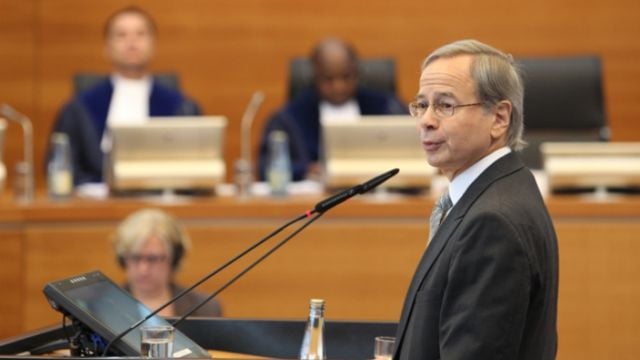Philippines Presents Maritime Claims at the Hague

In a tribunal at the Permanent Court of Arbitration in the Hague on Tuesday, a delegation of nearly 50 lawyers and representatives for the Philippines gathered to present their case for territorial claims and usage rights in the South China Sea.
The Philippine claims contest China's assertion that it has sovereignty over waters surrounding its island construction projects in the Spratlys, and its interests in an area of the South China Sea encircled by its “nine-dash line.”
Other countries involved in the dispute, including Vietnam, Taiwan, Malaysia, Brunei and Indonesia, are said to be watching the proceedings closely to determine whether to file claims of their own.
Lawyers for the Philippines will be presenting a total of 15 claims to the court. “We are confident that we will get a favourable decision on some of the issues, but it would be unrealistic to expect that we will get a favourable decision on all issues," said Foreign Ministry spokesman Charles Jose in Manila.
Lead council for the Philippines Paul Reichler “belongs to a select group of elite lawyers with extensive experience litigating on behalf of Sovereign States before the International Court of Justice," according to Chambers Global 2010. He has previously represented Mauritius in a similar UNCLOS dispute with the U.K.
While the court's findings are in theory binding for Law of the Sea (UNCLOS) signatory nations like China, the arbitration panel has no enforcement ability, and in the past its findings have sometimes been ignored by litigants.
The United States has been closely involved in security issues in the area, including the provision of military equipment to Philippine forces and close transits (freedom of navigation operations) near Chinese island claims. However, the U.S. is not a signatory to UNCLOS.
China has denounced the court's proceedings and has refused to defend itself in the case. "Our position is clear: we will not participate to or accept the arbitration," foreign ministry spokesman Hong Lei recently said at a press briefing. The court has found that the defendant's non-participation does not prevent the consideration of Philippine claims.
Separately, both China and the U.S. are said to be dispatching naval reinforcements to the region. The recently comissioned U.S. littoral combat ship Milwaukie is already en route to the South China Sea, where it will join a complement that includes her sister ship the Fort Worth.
While China has reiterated its claims that it is not militarizing the area – and, contrastingly, that its civilian island installations are critical to its military interests – it commissioned its Army's largest support vessel on Tuesday, the nearly 3,000 grt GY820, to provide supply shipments to its claim at Woody Island in the Paracels.
Recent comments at the ASEAN summit in Malaysia suggest the sense of a growing cohesive front against China's claims, as Barack Obama reportedly said that Chinese policy in the region had done much to unite other ASEAN member nations.
But the risk of escalation is cause for concern for some interested observers. On the sidelines of the summit, Australian Prime Minister Malcolm Turnbull indirectly warned his Chinese counterpart Premier Li Keqiang of the growing risk of war.
Media report that Mr. Turnbull referred to the history of the ancient Greek Peloponnesian War as he told Mr. Li that China risked a "fall into a Thucydides Trap,” so named after the classical historian. The Peloponnesian War began due to Sparta's fear of Athens' growing power, which led to escalating tensions and eventually war; Mr. Turnbull’s reference suggests that this pattern might apply to the South China Sea.
